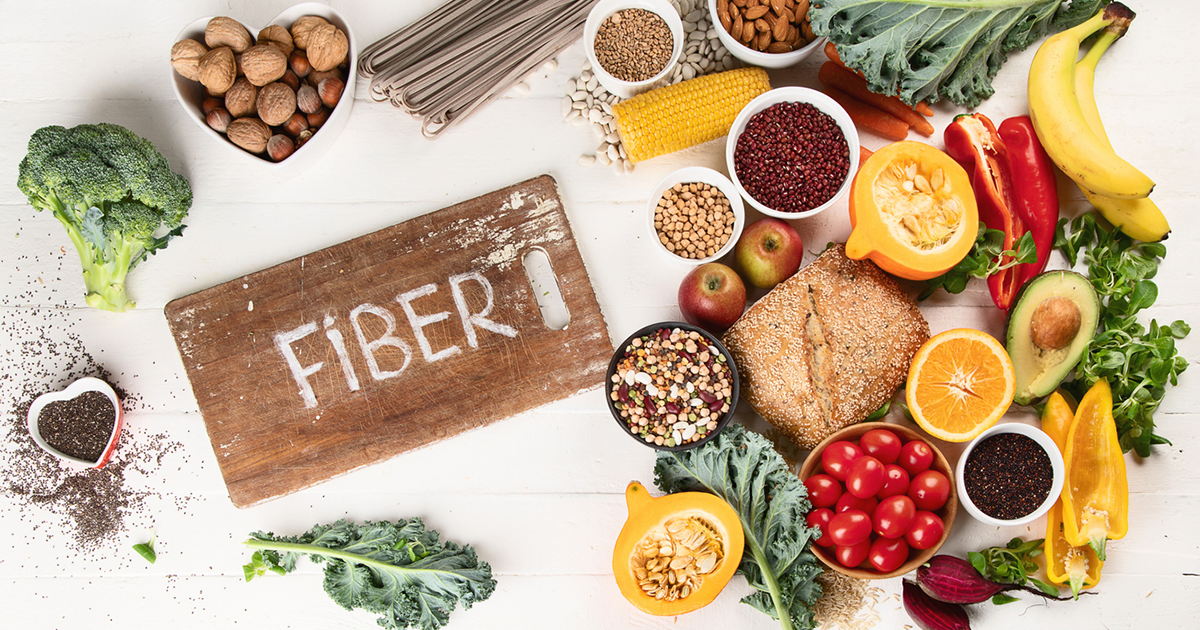Dietary fibre, also known as roughage, is the general term for a range of different carbohydrates found in the diet which are not digested by the body.
The 2 main types of fibre are.
- Soluble fibre – fibres which dissolve in warm water
- Insoluble fibre – fibres which don’t dissolve in warm water.
Plant foods usually contain both soluble and insoluble fibre, albeit the proportions can vary quite significantly between different plant foods.
For example, whole grain foods are particularly high in insoluble fibre, whereas say fruits such as apples tend to be higher in soluble fibre.
Recommended fibre intake
The Department of Health recommends that most of us should have 18g of fibre a day.
The NHS notes that in the UK, the average person only has 14g of fibre daily, meaning that most of us fail to meet the recommended intake of fibre.
The increased demand for processed and ready-made foods in place of home cooked meals, in recent decades, offers an explanation for the lower than recommended intakes of fibre amongst the UK population.
How is soluble and insoluble fibre different?
Soluble fibre binds with water to form a gel and this has been shown to have beneficial properties in slowing down digestion and the absorption of energy from the food.
The way soluble fibre behaves has benefits for lowering cholesterol, improving blood glucose levels, reducing appetite and improving heart health.
Insoluble fibre, which does not dissolve in water, also plays a necessary role in helping matter to move through the gut efficiently, helping to reduce bowel problems such as constipation, haemorrhoids and diverticulosis.
Low fibre intake and type 2 diabetes risk
Research has found that low intake of fibre has been linked with higher rates of type 2 diabetes A Harvard study of healthcare professionals found that diets with a higher intake of cereal fibre was associated with a lower incidence of type 2 diabetes.
Whilst fibre intake is just one of many factors that has been linked with the risk of developing type 2 diabetes, the benefits of dietary fibre show it to be an important part of diet that can help to improve overall health in a multitude of ways.
How can I increase my fibre intake?
Eat plenty of vegetables. The Department of Health advises us to eat least 5 portions of vegetables and fruit each day. Generally speaking, beating rather than meeting the daily target is recommended. Note that in terms of meeting vegetable targets, potatoes do not count towards the targets.
If you’re buying starchy foods such as rice, bread or pasta, look for those with higher amounts of fibre per 100g. Foods listed as whole grain should usually be good picks but checking the nutritional value per 100g tends to be the most reliable way of ensuring you pick a high fibre option.
The NHS recommends increasing fibre gradually as sudden increases in fibre could lead to stomach cramps and bloating in the short term. If increasing your daily fibre intake, ensure you keep yourself hydrated It is recommended to have around 1.2 litres of fluid a day, which is about 6-8 mugs or glasses a day.
Fibre supplements
Generally speaking, it’s best to meet the fibre intake recommendations with a combination of vegetables and whole grains, as these will provide a range of nutritional benefits in addition to the fibre they contain.
However, some people with specific dietary needs may wish to or need to take fibre supplements. Fibre supplements may be soluble fibre based, insoluble fibre based or a combination of the two.
Fibre supplements may be based on one or more the following fibres:
- Psyllium
- Inulin
- Guar gum
- Flax
- Cellulose
If you are taking supplements, it is recommended to drink adequate fluid and you may find you need to drink slightly more than the recommendation of 1.2 litres of fluid a day.
Common side effects of fibre supplements include bloating and flatulence and it may be advisable to introduce fibre supplements gradually to reduce such side effects.





